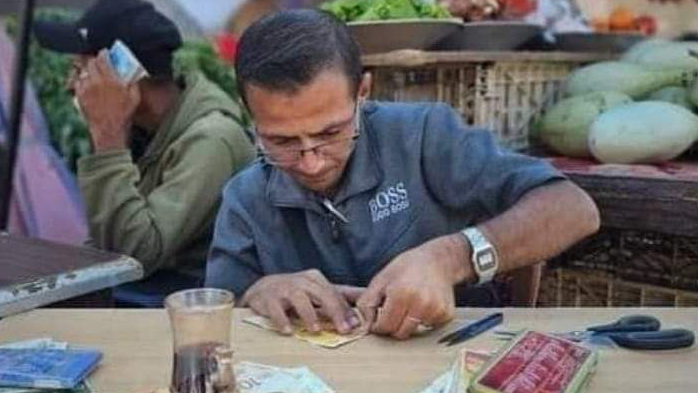Getting your Trinity Audio player ready...
The prolonged closure of bank branches in Gaza and the halt in the influx of new currency since the war began have left residents using the same worn-out banknotes for nearly a year, complicating the already fragile commercial activity and sparking a rise in counterfeit currency.
A new profession has emerged on the margins of this crisis—“banknote cleaning.” For a fee, Gaza residents can have their worn-out currency cleaned: a 100-shekel note costs 4 shekels to clean, a 20-shekel note costs 2 shekels, and a 200-shekel note costs 5 shekels. Some have even developed methods to repair torn notes or refresh them using cleaning products. Markets in Gaza are now seeing old and battered 100- and 20-shekel bills re-enter circulation.
Local vegetable vendor Mohamed Ghazi told local media, “The notes are used so much they rot, and I refuse to accept them,” leaving many Gazans desperate for usable cash.
Mahmoud Abd al-Nabi, who works in a currency exchange shop, has found a solution to preserve the life of his customers' banknotes. “I clean old notes with water and soap, hang them to dry in the sun, and return them to customers,” he said. “I wash between 10,000 and 15,000 shekels daily to restore them.”
Trader Munir al-Sayed warned of the economic consequences facing Gazans, especially in the northern Gaza Strip where commercial activity is nearly nonexistent. "The only solution is to reopen the banks that have been closed since the war began, replace the worn-out notes and inject new currency into the markets," he said.
Additionally, ATM withdrawals in Gaza now incur fees of 10%-20%. Before the war, there were around 20 currency exchange shops in Gaza City alone, many managed or taxed by Hamas. These shops dealt in various currencies, including the Israeli shekel, Jordanian dinar, U.S. dollar and Egyptian pound, with prices in Gaza determined by market demand.




